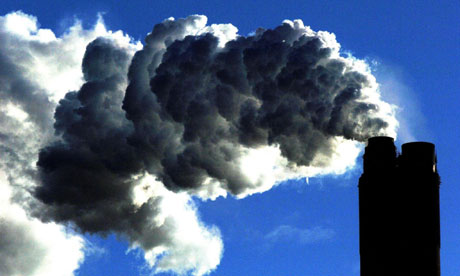Hopes of 30% cut in greenhouse emissions dashed
EU energy chief fears target would lead to a too-fast process of de-industrialisation as compared to current 20%
- guardian.co.uk,
- Article history

The UK government's plan to push Europe to deeper cuts on greenhouse gas emissions has been dashed by the EU's energy chief.
Günther Oettinger, the EU's energy commissioner, dealt a heavy blow to the hopes of several member states that have been pressing for a target of slashing emissions by 30% by 2020, against the current 20%.
He said the tougher target would force industries to move to Asia. "If we go alone to 30%, you will only have a faster process of de-industrialisation in Europe," he said, citing the steel industry as one of the likely casualties. "I think we need industry in Europe, we need industry in the UK, and industry means CO2 emissions."
Europe could only adopt a tougher target if other major economies were also willing to do so, he said. "We are willing to go to 30 % if big global partners will follow us, but if not we won't."
Governments and political leaders have been wrangling for months over the EU's targets. Last spring, the EU's environment commissioner, Connie Hedegaard, published research that suggested the steep fall in emissions that followed the financial crisis and recession meant it would be far easier and cheaper than before for Europe to slash emissions.
Moving to the higher target would cost about €81bn (£68.4bn) a year by 2020, or 0.54% of GDP, according to the European commission's research, compared with a cost of €48bn for the 20% goal. But the move would quickly yield benefits including more green jobs, better health outcomes from less air pollution, and would make reducing emissions beyond 2020 much easier.
Though Hedegaard stopped short of recommending the higher target, the analysis was seized on by Chris Huhne, secretary of state for energy and climate change, who gathered the support of his French and German counterparts and a large coalition of businesses and investors to push the commission to the 30% goal. They argued that it would give European industry a headstart in its race with China to dominate the rapidly growing global market for low-carbon technology.
By providing a stronger signal on emissions, it would also help companies to avoid the problem of stranded assets, whereby long-term investments made now in high-emitting technology, such as gas-fired power stations, could become obsolete decades before their intended lifecycle was up.
Environmental groups strongly supported the higher target, warning that the current goal was too weak to give the world a chance of fighting climate change.
But several large industry lobbying groups have rejected the proposal, arguing that it would place too great a burden on European businesses already weakened by the recession.
The CBI, the UK employers' organisation, along with its Europe-wide counterparts, said it would jeopardise jobs and growth. Several EU member states including Italy and Poland also oppose the plan.
The fall in emissions resulting from the recession did not make the 30% target easier to reach, Oettinger argued last night.
"[It shows] the best thing for CO2 emissions is a crisis, so do we need longer and deeper crises?" he asked. "Look at our deficit – we need growth, and we need more industry."

No comments:
Post a Comment